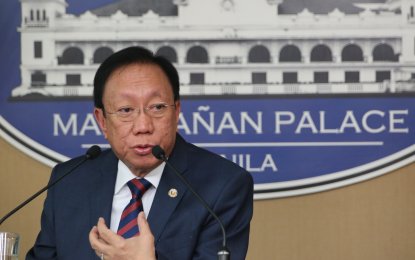News
SolGen asks SC to dismiss petition to allow same-sex marriage in PH

The definition of marriage adopted by the drafters of our Constitution is guided by the teachings of history and the recognition of the traditions that underlie our society. Marriage, as traditionally conceived in the Philippines, has always been between a man and a woman. Articles 1 and 2 of the Family Code are constitutional,” Calida argued. (PNA photo)
MANILA — Solicitor General Jose Calida on Tuesday asked the Supreme Court (SC) to dismiss the petition filed in May 2015 challenging the validity of provisions of the Family Code limiting marriage to heterosexual couples.
During the resumption on the oral arguments on the matter, Calida argued that the petition filed by lawyer Jesus Nicardo Falcis III on May 18, 2015, seeking the lifting of the prohibitions on same-sex marriage for being unconstitutional, has no basis in law and must be stricken down.
“The definition of marriage adopted by the drafters of our Constitution is guided by the teachings of history and the recognition of the traditions that underlie our society. Marriage, as traditionally conceived in the Philippines, has always been between a man and a woman. Articles 1 and 2 of the Family Code are constitutional,” Calida argued.
Quoting 1987 Constitutional Commission member Bernardo Villegas, Calida explained that “same sex relationships was foremost on the minds of the framers [of the 1987 Constitution] when they deliberated on the meaning of family and marriage,” stressing that while there was empathy for this sector of society, “both natural law and religious values affirm that the normal family relationship is between man and woman.”
“The framers intended marriage as a union between a man and a woman… it is clear that marriage has always been defined as a union between a man and a woman primarily to constitute a complete and perfect community between two heterosexual individuals and, consequently, to preserve the human race,” Calida insisted.
He also argued that limiting the definition of marriage as a union between a man and a woman under the Family Code is a “valid exercise” of the state’s police power.
During interpellation, Associate Justice Marvic Leonen asked Calida on the harm in allowing same-sex couples to get married, to which the latter replied: “Well, the harm your honor is that the Constitution and our laws do not sanction such marriage.”
Leonen also questioned Calida on why the law is being interpreted in such a way that it would “impose something on the freedom and happiness of others without showing a viable reason except tradition.”
The magistrate also grilled Calida on whether the Constitution provision on marriage specifically states that it should be between opposite sex.
“There is constitutional construction.
It doesn’t have to be defined. It is the big elephant in this room,” Calida replied.
Leonen then argued: “Are we not going to interpret the Constitution and the law in such a way that what we wish and what we desire is imposed upon another couple?”
“Why do we interpret our laws and our Constitution that we impose something on the freedoms and happiness of others, without showing a very viable reason except tradition?” Leonend asked Calida.
The top government counsel, however, stood firm on his stance and said that the petitioners should be “able to convince the framers of our Constitution to change the concept of marriage and expand it to same sex couples.”
Calida later softened his stance and said: “It does not say in such language.” He added that he will expound on his reply to Leonen’s questions in his memorandum.
Falcis, who admitted being gay, sought the lifting of the prohibitions on same-sex marriage for being unconstitutional.
He explained that limiting civil marriages and rights that go with it to heterosexuals violated the Constitutionally-guaranteed provisions on equal treatment, undue interference to liberty rights and marital autonomy.
Falcis is asking the Court to nullify portions of Articles 1 and 2 of the Family Code, which defines and limits marriage as between man and woman”; and to “nullify portions of Articles 4.6 (4) and 55 (6) which mentions lesbianism or homosexuality as grounds for annulment and legal separation of the Family Code as a consequence of the unconstitutionality of Articles 1 and 2.”
Limiting civil marriage to heterosexuals does not violate one’s rights to due process and equal protection of laws, and does not violate religious freedom, Calida further argued.
As to the first two rights, Calida explained that the state is merely upholding a traditional concept of marriage, the limitation applies to all opposite-sex couples, and only opposite-sex marriage can procreate.
As to religious freedom, Calida pointed out that “the exercise of religious freedom is neither absolute nor all-encompassing” as it cannot have its way over state interest.
“The Family Code is a valid state regulation founded on a purely secular purpose when it limited civil marriages to opposite-sex couples. The overriding state interest is the preservation of the tradition and history of marriage in the Philippines as a union between a man and a woman for the primary purpose of procreation,” he argued.
“The Office of the Solicitor General has always been of the position that the pursuit of happiness is everyone’s birthright. Same-sex couples can live happily together. But they cannot demand that the state recognize same-sex marriages because the Constitution simply does not allow such unions,” he added.
Meanwhile, Acting Chief Justice Antonio Carpio directed both parties to submit their respective memoranda within 30 days from Tuesday, including all topics Justices pointed out to be tackled.





















